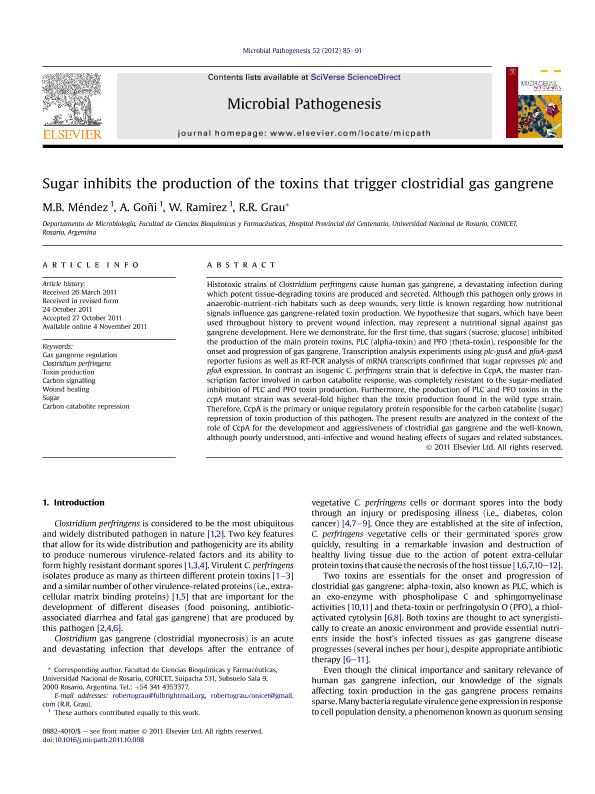Mostrar el registro sencillo del ítem
dc.contributor.author
Méndez, M. B.
dc.contributor.author
Goñi, Anibal Juan

dc.contributor.author
Ramirez, W.
dc.contributor.author
Grau, Roberto Ricardo

dc.date.available
2023-03-06T15:48:14Z
dc.date.issued
2012-01
dc.identifier.citation
Méndez, M. B.; Goñi, Anibal Juan; Ramirez, W.; Grau, Roberto Ricardo; Sugar inhibits the production of the toxins that trigger clostridial gas gangrene; Academic Press Ltd - Elsevier Science Ltd; Microbial Pathogenesis; 52; 1; 1-2012; 85-91
dc.identifier.issn
0882-4010
dc.identifier.uri
http://hdl.handle.net/11336/189698
dc.description.abstract
Histotoxic strains of Clostridium perfringens cause human gas gangrene, a devastating infection during which potent tissue-degrading toxins are produced and secreted. Although this pathogen only grows in anaerobic-nutrient-rich habitats such as deep wounds, very little is known regarding how nutritional signals influence gas gangrene-related toxin production. We hypothesize that sugars, which have been used throughout history to prevent wound infection, may represent a nutritional signal against gas gangrene development. Here we demonstrate, for the first time, that sugars (sucrose, glucose) inhibited the production of the main protein toxins, PLC (alpha-toxin) and PFO (theta-toxin), responsible for the onset and progression of gas gangrene. Transcription analysis experiments using plc-gusA and pfoA-gusA reporter fusions as well as RT-PCR analysis of mRNA transcripts confirmed that sugar represses plc and pfoA expression. In contrast an isogenic C. perfringens strain that is defective in CcpA, the master transcription factor involved in carbon catabolite response, was completely resistant to the sugar-mediated inhibition of PLC and PFO toxin production. Furthermore, the production of PLC and PFO toxins in the ccpA mutant strain was several-fold higher than the toxin production found in the wild type strain. Therefore, CcpA is the primary or unique regulatory protein responsible for the carbon catabolite (sugar) repression of toxin production of this pathogen. The present results are analyzed in the context of the role of CcpA for the development and aggressiveness of clostridial gas gangrene and the well-known, although poorly understood, anti-infective and wound healing effects of sugars and related substances.
dc.format
application/pdf
dc.language.iso
eng
dc.publisher
Academic Press Ltd - Elsevier Science Ltd

dc.rights
info:eu-repo/semantics/openAccess
dc.rights.uri
https://creativecommons.org/licenses/by-nc-sa/2.5/ar/
dc.subject
CARBON CATABOLITE REPRESSION
dc.subject
CARBON SIGNALLING
dc.subject
CLOSTRIDIUM PERFRINGENS
dc.subject
GAS GANGRENE REGULATION
dc.subject
SUGAR
dc.subject
TOXIN PRODUCTION
dc.subject
WOUND HEALING
dc.subject.classification
Biología Celular, Microbiología

dc.subject.classification
Ciencias Biológicas

dc.subject.classification
CIENCIAS NATURALES Y EXACTAS

dc.title
Sugar inhibits the production of the toxins that trigger clostridial gas gangrene
dc.type
info:eu-repo/semantics/article
dc.type
info:ar-repo/semantics/artículo
dc.type
info:eu-repo/semantics/publishedVersion
dc.date.updated
2023-03-05T15:35:24Z
dc.journal.volume
52
dc.journal.number
1
dc.journal.pagination
85-91
dc.journal.pais
Estados Unidos

dc.description.fil
Fil: Méndez, M. B.. Universidad Nacional de Rosario. Facultad de Ciencias Bioquímicas y Farmacéuticas. Departamento de Microbiología; Argentina
dc.description.fil
Fil: Goñi, Anibal Juan. Universidad Nacional de Rosario. Facultad de Ciencias Bioquímicas y Farmacéuticas. Departamento de Microbiología; Argentina. Consejo Nacional de Investigaciones Científicas y Técnicas. Centro Científico Tecnológico Conicet - Rosario; Argentina
dc.description.fil
Fil: Ramirez, W.. Universidad Nacional de Rosario. Facultad de Ciencias Bioquímicas y Farmacéuticas. Departamento de Microbiología; Argentina
dc.description.fil
Fil: Grau, Roberto Ricardo. Universidad Nacional de Rosario. Facultad de Ciencias Bioquímicas y Farmacéuticas. Departamento de Microbiología; Argentina. Consejo Nacional de Investigaciones Científicas y Técnicas. Centro Científico Tecnológico Conicet - Rosario; Argentina
dc.journal.title
Microbial Pathogenesis

dc.relation.alternativeid
info:eu-repo/semantics/altIdentifier/url/https://www.sciencedirect.com/science/article/abs/pii/S0882401011001902
dc.relation.alternativeid
info:eu-repo/semantics/altIdentifier/doi/http://dx.doi.org/10.1016/j.micpath.2011.10.008
Archivos asociados
